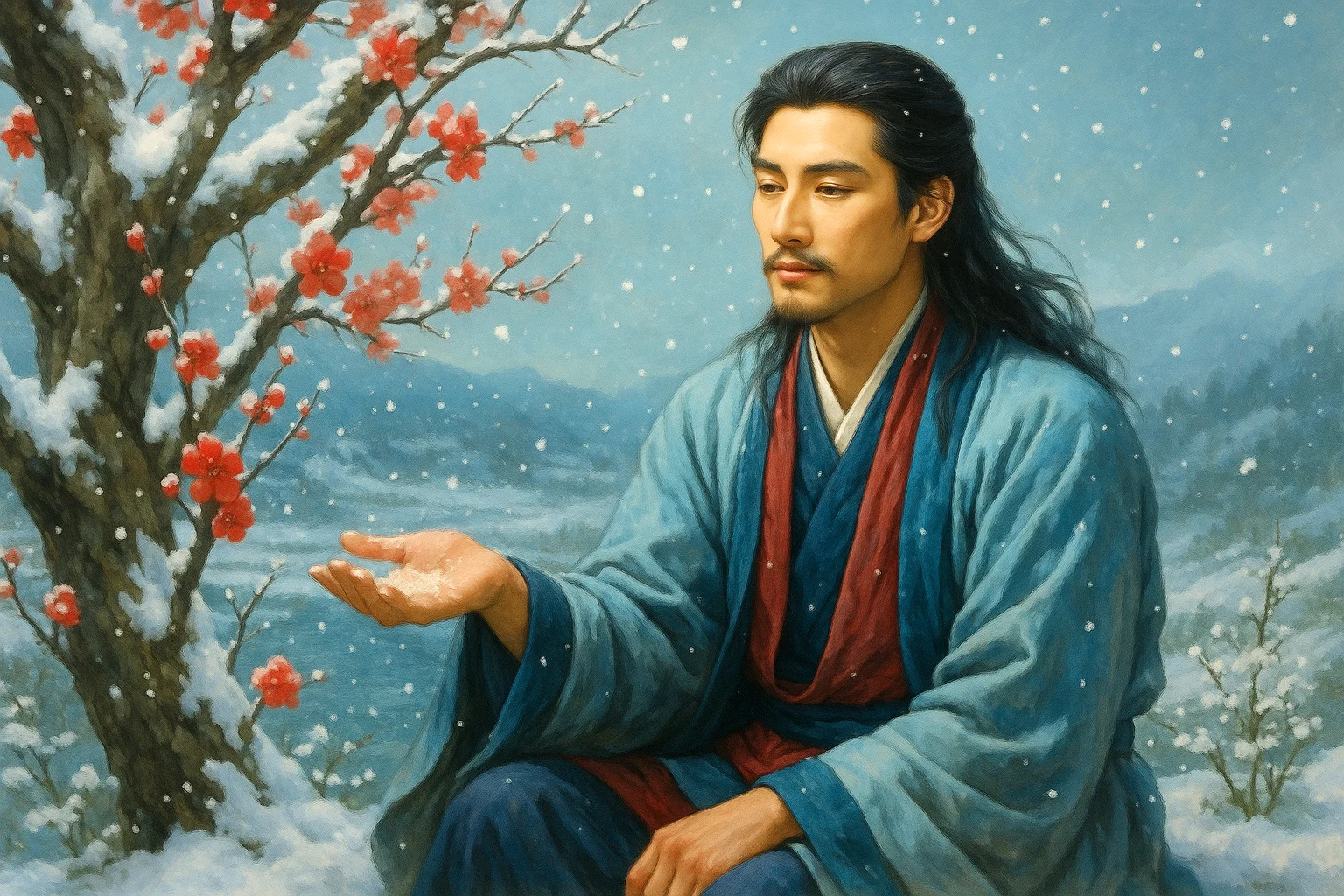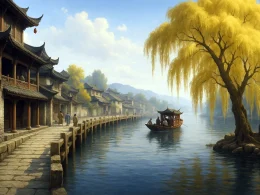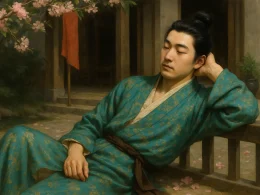Mossy branches studded with jade,
Tiny emerald birds rest together on the bough.
Meeting far from home,
At dusk by the garden’s corner,
Silent, leaning on the slender bamboo.
Zhaojun’s heart unaccustomed to desert sands afar,
Yet secretly recalls the rivers north and south.
Imagines the jade pendants, returning on a moonlit night,
Transforming into this flower’s lonely grace.
Still remembering palace tales of old,
That one just waking,
Fluttering close like green moths.
Unlike spring’s breeze, careless and warm,
Long ago arranged golden chambers now untouched.
One petal drifts away with the waves,
Yet laments the sorrowful jade dragon’s tune.
When, then, to find that quiet fragrance again?
It has slipped through the small window’s horizontal scroll.
Original Poem
「疏影 · 苔枝缀玉」
姜夔
苔枝缀玉,有翠禽小小,枝上同宿。
客里相逢,篱角黄昏,无言自倚修竹。
昭君不惯胡沙远,但暗忆、江南江北。
想佩环、月夜归来,化作此花幽独。
犹记深宫旧事,那人正睡里,飞近蛾绿。
莫似春风,不管盈盈,早与安排金屋。
还教一片随波去,又却怨、玉龙哀曲。
等恁时、重觅幽香,已入小窗横幅。
Interpretation
Composed around 1198 during Emperor Ningzong's reign, this ci poem represents one of Jiang Kui's most celebrated "self-composed melodies" (自度曲), forming a diptych with "Fragrant Shadows." Written in his innovative "interlocking style" (连环体), it employs plum blossoms as a medium to express his own unyielding purity and tender reverence for beauty. Blending landscape aesthetics, feminine imagery, and literary allusions, the work builds profound emotion within an exquisitely refined atmosphere, embodying the serene introspection and moral independence of Jiang's late style.
First Stanza: "苔枝缀玉,有翠禽小小,枝上同宿。客里相逢,篱角黄昏,无言自倚修竹。"
Tái zhī zhuì yù, yǒu cuì qín xiǎo xiǎo, zhī shàng tóng sù. Kè lǐ xiāng féng, lí jiǎo huáng hūn, wú yán zì yǐ xiū zhú.
Jade-like blooms on moss-kissed boughs,
Where tiny kingfishers alight and house.
A traveler's chance encounter—
By dusk-lit fence, she leans in silence,
Against tall bamboos, her lone figure.
The opening paints an ethereal "blossom-and-bird" tableau. "Chance encounter" (客里相逢) metaphorizes fleeting connections in life's journey, while the plum's silent posture—personified as a solitary beauty—conveys unspoken longing through scenery.
Second Stanza: "昭君不惯胡沙远,但暗忆、江南江北。想佩环、月夜归来,化作此花幽独。"
Zhāo jūn bù guàn hú shā yuǎn, dàn àn yì, Jiāng nán Jiāng běi. Xiǎng pèi huán, yuè yè guī lái, huà zuò cǐ huā yōu dú.
Zhaojun never grew used to Tartar sands,
Secretly recalling southern lands.
Her jade pendants, moonlit returning,
Become this flower's solitary yearning.
The allusion to Wang Zhaojun (昭君), the Han princess exiled to the steppes, merges the plum's isolation with homesickness. The transformation of her "jade pendants" (佩环) into blossoms fuses human and floral sorrow, crystallizing the poem's emotional core.
Third Stanza: "犹记深宫旧事,那人正睡里,飞近蛾绿。"
Yóu jì shēn gōng jiù shì, nà rén zhèng shuì lǐ, fēi jìn é lǜ.
I recall palace lore of old—
How one bloom, as she slept,
Alighted on her emerald brow's crest.
The "Princess Shouyang" legend (梅妆) enters here: a plum petal famously graced the sleeping princess's forehead, inspiring floral makeup. This interlude weaves historical romance into the imagery, transient yet poignant.
Fourth Stanza: "莫似春风,不管盈盈,早与安排金屋。"
Mò sì chūn fēng, bù guǎn yíng yíng, zǎo yǔ ān pái jīn wū.
O, be not like the heedless spring breeze,
But prepare a golden chamber with ease,
To shelter her radiant grace!
The plea to "shelter her radiant grace" (安排金屋) references Emperor Wu's "golden house" for his beloved Consort Chen. Beyond literal flower preservation, it voices Jiang's philosophical ideal: protecting all fragile beauty—whether artistic, human, or moral.
Fifth Stanza: "还教一片随波去,又却怨、玉龙哀曲。等恁时、重觅幽香,已入小窗横幅。"
Hái jiāo yī piàn suí bō qù, yòu què yuàn, yù lóng āi qǔ. Děng nèn shí, chóng mì yōu xiāng, yǐ rù xiǎo chuāng héng fú.
Yet petals drift with streams away,
Leaving but the "Jade Dragon's" mournful lay.
When next I seek her scent so rare,
She's dissolved into my window's painted air.
The conclusion embraces inevitable loss. The "Jade Dragon's dirge" (玉龙哀曲) refers to a legendary flute tune summoning spirits, here lamenting the plum's passing. The final metamorphosis—into "painted air" (横幅)—sublimates physical beauty into eternal art, achieving transcendent closure.
Holistic Appreciation
This ci poem masterfully blends personification, historical references, and vivid imagery to create a profound meditation on the plum blossom. The first stanza presents two contrasting scenes: the lively "emerald birds at rest" shifts to the lonely figure "leaning against tall bamboos," with the phrase "solitary grace" perfectly capturing both the mood and the setting. The second stanza opens with the image of floral adornment, then builds emotional depth through evocative scenes like "a golden chamber's hidden beauty" and "a jade flute's sorrowful melody." The closing line—"now preserved within my window's painted scroll"—merges the real and the artistic, leaving a lingering sense of wistfulness.
Jiang Kui uses the plum blossom not just as a natural subject but as a mirror for human experience, intertwining personal reflection with broader themes of beauty and transience. The result is a work of quiet elegance and depth, characteristic of his most distinctive style.
Artistic Merits
- Rich Symbolism: The poem draws on multiple layers of meaning, with each reference adding nuance to the portrayal of the plum's enduring spirit.
- Humanized Nature: The plum blossom becomes a graceful yet melancholic figure, reflecting ideals of beauty and resilience.
- Circular Composition: Motifs like "secret remembrance," "solitary grace," and "moonlit return" echo throughout, creating a harmonious and introspective structure.
- Precise and Evocative Language: Phrases such as "jade-adorned mossy branches" and "pale green elegance" paint vivid pictures with remarkable economy of words.
Insights
This poem transcends a simple tribute to the plum blossom, becoming instead a meditation on beauty, memory, and perseverance. It reminds us to value fleeting yet meaningful moments, especially in times of change or solitude. The recurring theme of preserving beauty speaks to a deeper human desire to hold onto what is precious, even as time passes. Today, this ci remains a poignant reflection on how we cherish and protect the fragile yet enduring aspects of life.
About the poet

Jiang Kui (姜夔, c. 1155 - 1221), a native of Poyang, Jiangxi, was a Southern Song Dynasty lyric poet and musician. He remained a commoner throughout his life. His lyrics are known for their ethereal and austere style, and his poetry is also highly regarded. Along with Fan Chengda and Yang Wanli, he is celebrated as one of the "Four Great Masters of the Restoration."












